Dental Crowns
Have you noticed a tooth that’s cracked, decayed, or just doesn’t feel right? Maybe you’ve tried to manage it, but it’s affecting your smile or making eating uncomfortable. When damage occurs to your teeth, whether from decay, injury, or wear, it can impact how you look, how you eat, and how confident you feel. But you don’t have to live with it.
The Quick Fix for Damaged & Decaying Teeth
Dental Crown Near Me
What Are Dental Crowns?
A dental crown helps restore the function of a tooth that is decayed or damaged. It allows a tooth to regain its original shape and size, functioning as your natural teeth would. You could need a dental crown for a number of reasons, such as:
- A damaged or decayed tooth
- Cracked or broken tooth
- A tooth that is so discoloured that veneers and whitening are not viable
- Small, misshapen tooth
- A fragile tooth after a root canal treatment
If a filling is not strong enough to support the tooth, a crown may be recommended by your dentist.
Benefits Of Dental Crowns Treatment
- Restores Tooth Strength
- Protects a Damaged Tooth
- Improves Appearance
- Long-Lasting Solution
- Supports Dental Restorations
- Custom Fit and Natural Look
Dental Crowns Treatments In Halifax
4 Simple Steps. 1 Great Smile.
Consultation and Assessment
We begin with a comprehensive examination to evaluate the health and structure of your teeth. Digital scans and 3D imaging technology capture every detail, allowing us to plan a personalised restoration.
Tooth Preparation
Your dentist will prepare the tooth by removing any decayed or damaged tissue, then the tooth will be trimmed and shaped in order to prep for the crown. If there is significant tooth loss your dentist may have to use filling material to support the crown.
Digital Impressions
We take precise digital impressions, ensuring a perfect fit and bite alignment. These impressions are sent to a specialised lab for the custom crafting of your crown.
Fitting and Bonding
When your crown is ready, we carefully place and bond it to the tooth with advanced adhesives for a durable hold. We refine the restoration to ensure it aligns with your bite and polish it for a smooth, natural feel, leaving you with a restored smile that looks and feels natural.
Single & Multiple Crown Placement
Perfect your smile with dental crown treatment, a versatile and effective solution for restoring both function and beauty to your teeth. Whether you’re dealing with a chipped, cracked, discoloured, or severely decayed tooth, a dental crown can provide long-lasting protection while blending seamlessly with your natural smile. For patients that require a more extensive restoration, full-mouth crown treatments can dramatically transform your appearance, improve bite alignment, and enhance oral health. Custom-made to match the shape, size, and colour of your existing teeth, dental crowns offer a durable and aesthetically pleasing way to regain confidence and enjoy a radiant, healthy smile.
When Should I Consider A Dental Crown?
Severely Decayed Teeth
When a cavity is too large for a filling, a crown can restore the tooth’s shape and strength.
Cracked or Broken Teeth
Crowns protect cracked or broken teeth from further damage and restore full function.
After Root Canal
A tooth that has had a root canal often becomes brittle, and a crown helps protect it long-term.
Worn Down Teeth
If your teeth are worn down due to grinding (bruxism) or acid erosion, crowns can rebuild their original shape and size.
Cosmetic Improvements
If a tooth is discoloured, misshapen, or otherwise unattractive, a crown can improve its appearance.
To Support a Dental Bridge
Crowns are used to anchor a dental bridge when replacing missing teeth.
To Cover a Dental Implant
Crowns are placed on top of implants to replace missing teeth.
Large Fillings
If a tooth has a large filling and not much natural structure left, a crown can offer more stability and durability.
Before & After Smile Gallery
View a selection of our before and afters of our dental crown patients below:
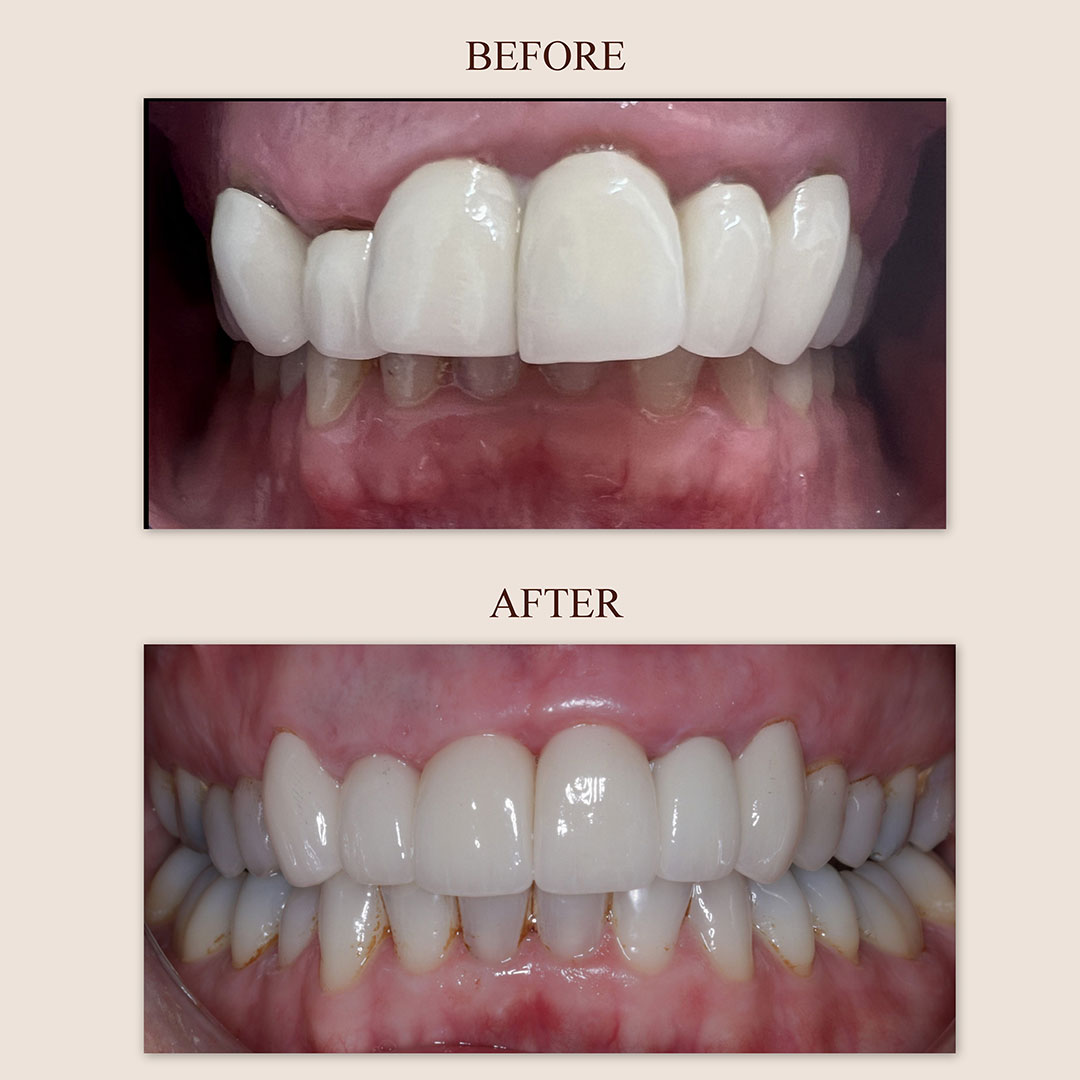
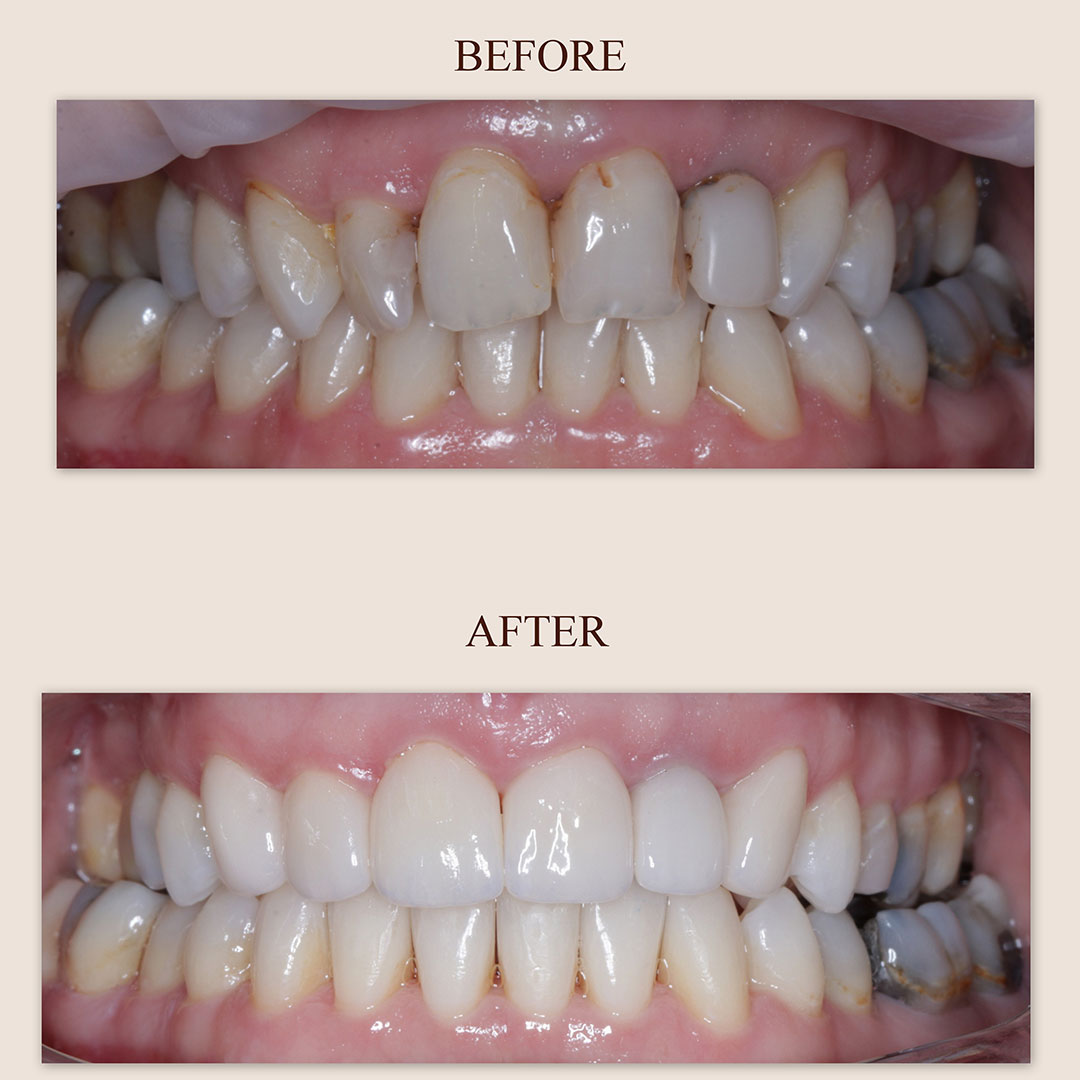
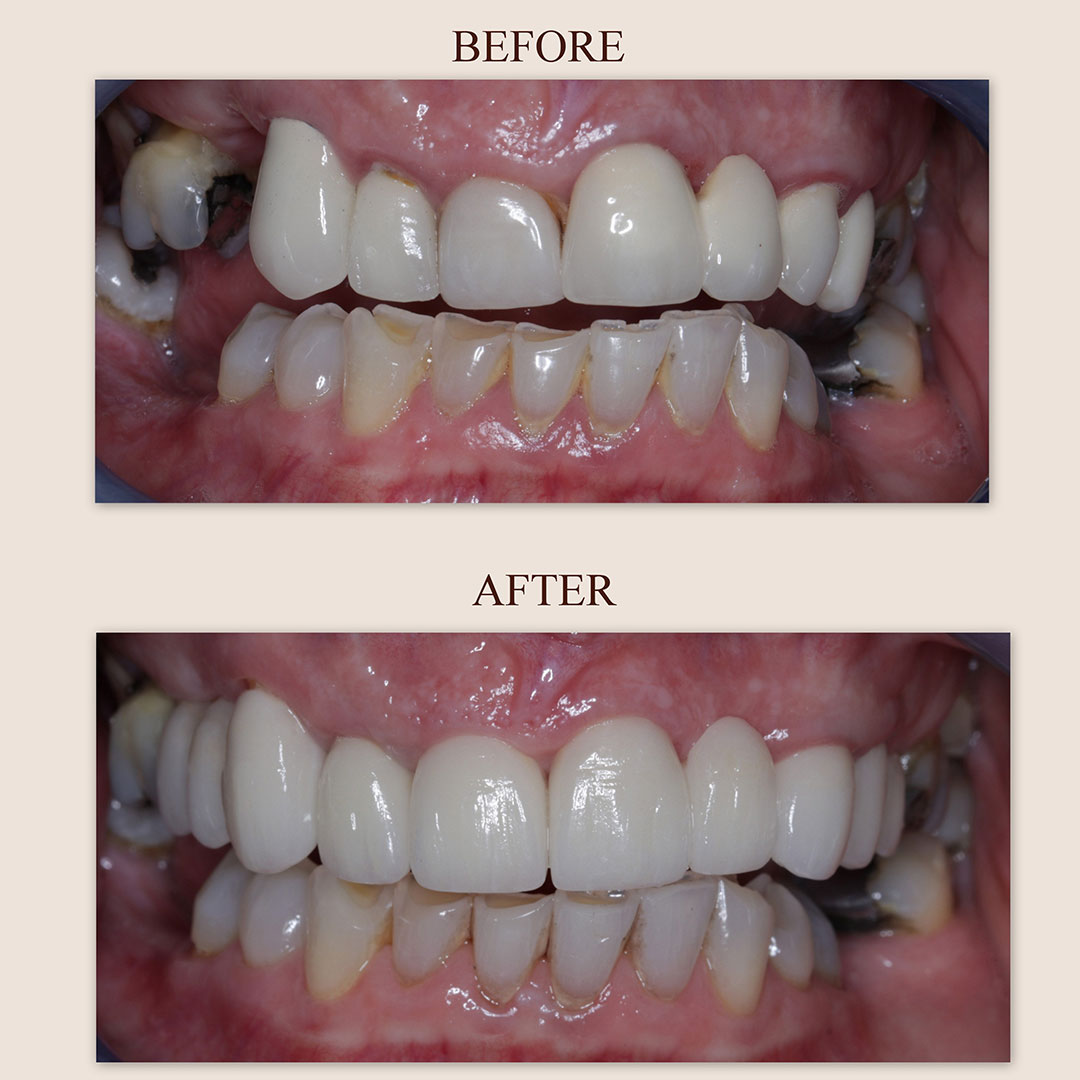
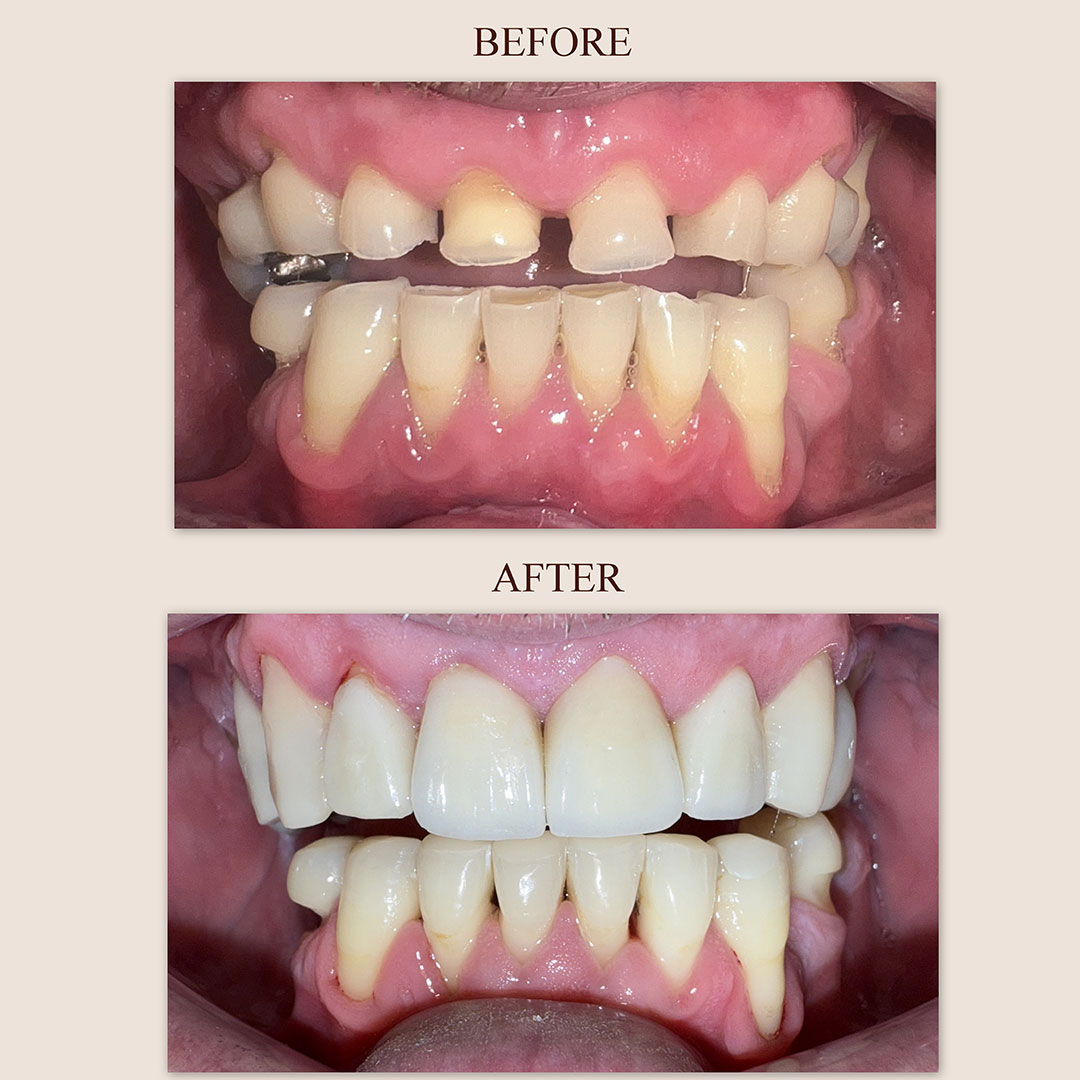
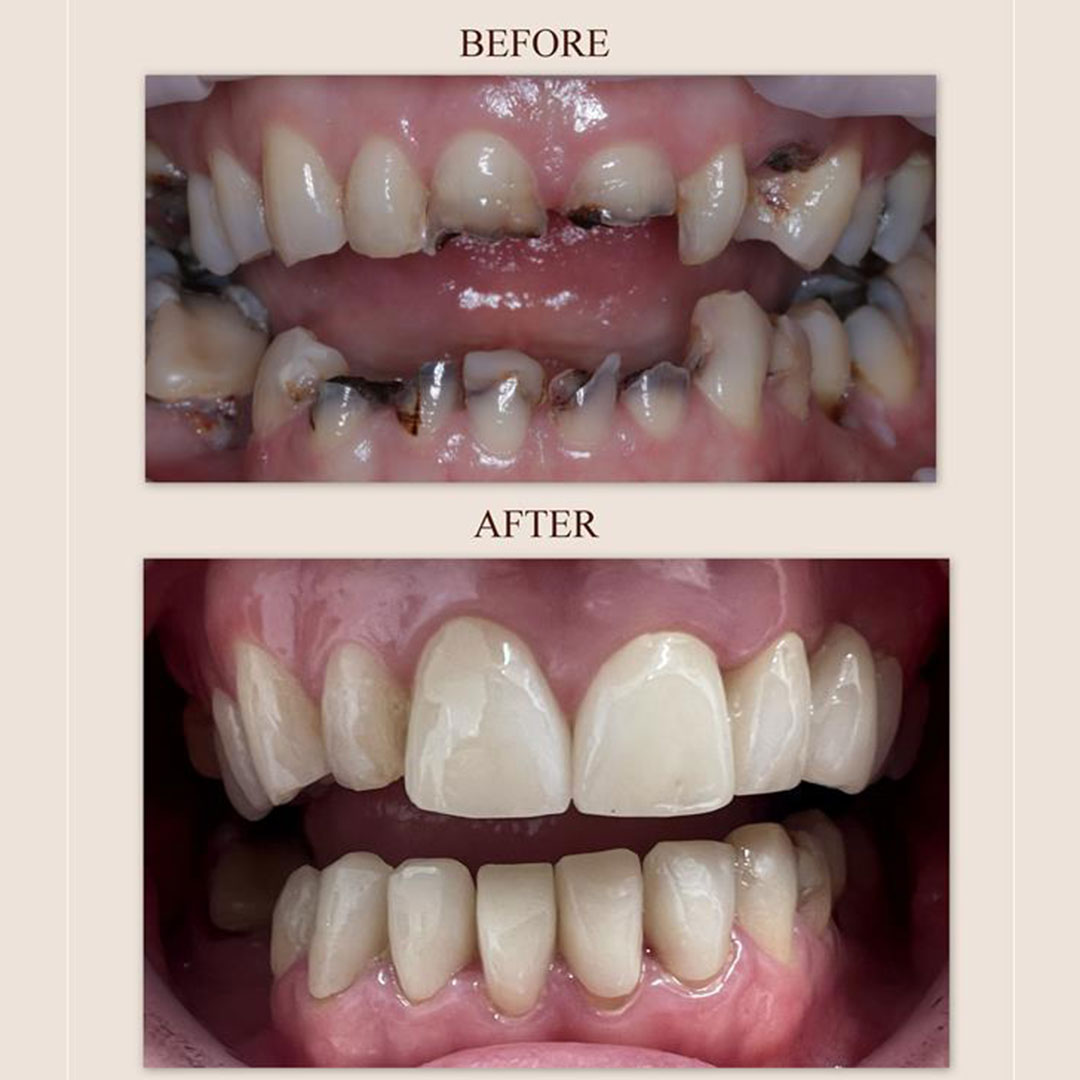
Dental Crowns Halifax
The Perfect Fix For Damaged Teeth
Ready to restore your smile with a dental crown? Get in touch with us using the links below to schedule a consultation:
Dental Crown Treatment
The Recovery Process
The area around your dental crown is likely to feel sensitive for a few days after treatment. However, once the soreness has subsided, aftercare for your dental crown is simple. Caring for dental crowns is just like caring for your existing teeth, with brushing twice a day for two minutes, regular flossing, and frequent dental checkups at our practice in halifax.
Dental Crowns
Frequently Asked Questions
A crown is a cosmetic replacement that functions and appears just like your normal teeth. Crowns are used when the top of a tooth is damaged beyond repair, but the root is healthy. This helps to preserve your jawbone and maintain a more youthful appearance compared to tooth extraction treatments.
These restorations are designed to be durable and long-lasting, often remaining functional for 10-15 years or longer with proper care. Factors that influence their longevity include your oral hygiene routine, the materials used, and your dietary habits. Avoiding habits such as grinding, clenching, or chewing on hard objects can also extend their lifespan. Regular dental check-ups allow your dentist to monitor the condition of your restorations and address any issues early.
Advantages of dental crowns
If you are thinking of getting dental crowns, then it is likely you are focused on relieving pain. However, crowns come with some benefits you might not have considered:
- Removes pain.
- Preserves the tooth root: Your underlying tooth remains in place.
- Maintains bone density: Keeping the original tooth root preserves your bone density and stops your mouth from puckering, which could make you look older.
- Replace worn, broken, discoloured and decayed teeth, improving your aesthetic.
- Protect teeth from further erosion with a new hard-wearing crown.
- Improve chewing, helping you to bite down confidently.
- Enhance appearance, helping you to smile confidently.
- Lasts 5-15 years with proper care.
Disadvantages of dental crowns
To help you fully evaluate your treatment, we have listed some of the disadvantages of having dental crowns below:
- Requires removal of natural tooth enamel to provide a surface for the crown to bond to your natural tooth. This is irreversible.
- Temporarily makes teeth sensitive. This stops after a few weeks.
- Can break or fracture just like your natural teeth.
- Can trap bacteria and cause decay if not properly fitted. Contact your dentist if you feel discomfort.
- Can rarely cause allergic reactions. Check for sensitive gums, swelling and irritation.
- Is an expensive cosmetic treatment that fixes a wide range of issues.
With proper sedation, the procedure of getting dental crowns will be painless. Discuss your sedation options during your dental consultation to better understand your options and outcomes. For the next few days and lasting up to 2 weeks your tooth can be sensitive to hot and cold, and your gums may become inflamed and sore. This can be managed by some temporary tweaks to your diet and over the counter pain medication.
- Inlays & Onlays: These cover any wear to the top of the tooth.
- Veneers: If the top and back of your tooth is in good condition, then veneers are an effective alternative to crowns.
- Dental Implants: If your tooth is damaged below the gum line, then dental crowns offer an effective way to replace your damaged tooth.
- Composite bonding: This treatment fills cavities and can re-build your broken tooth in a cost-effective treatment that lasts just a few hours.
Start Your Perfect Smile Journey With Us
If you’d like to book an appointment, ask a question or need any help, you can contact us using the form.
Get in Touch
- 01422 487365
- info@dentalicon.co.uk
- 2a Halifax Rd, Hipperholme, Halifax HX3 8ER
Opening Hours
Monday to Friday: 8.30am – 5.30pm
Saturday: By Appoitment Only
Sunday: Closed
Late Evening Appointments Available